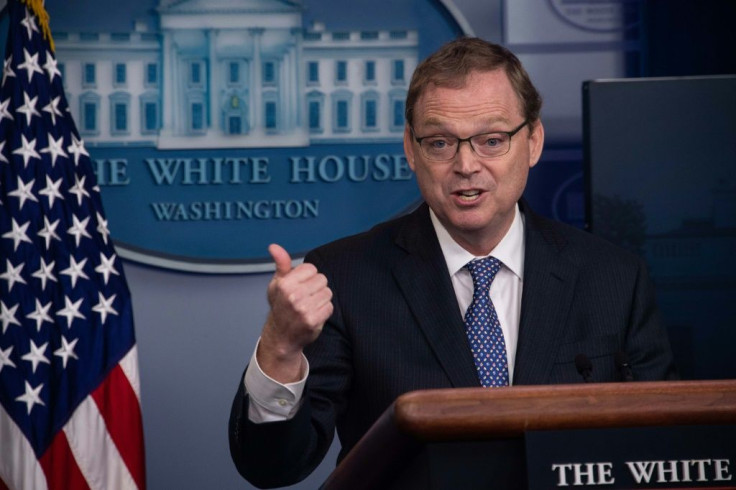Trump's Top Economists Are Leaving The White House As Pentagon Officials Resign

KEY POINTS
- Kevin Hasset, Trump's senior adviser on economic issues, leaves this post at the end of June
- Hasset once predicted deaths from COVID-19 in the U.S. would plunge to zero by May 15
- Hasset and Tomas Philipson's departures follow those of four other top officials at the Department of Defense
The departures of two of the Trump administration's top economic advisers -- Kevin Hassett and Tomas Philipson -- in the midst of an economic recession and the president's reelection campaign is puzzling D.C. and igniting speculation all is not well on the Donald Trump ship-of-state.
Their departures follow those of four other top officials at the Department of Defense (DoD) who resigned over the past two weeks for personal reasons and after clashing with Trump.
Hassett, who will leave his post on June 28 as Trump’s senior adviser on economic issues, refused to answer the media’s questions about his seemingly abrupt departure. White House insiders, however, pointed out Hassett was only on loan from the Council of Economic Advisers (CEA). Hassett, who was the former chairman of CEA, was serving in an unpaid capacity as Trump’s senior adviser and was expected to return to his job at the agency, which is within the Executive Office of the President.
He joined the Trump team March 20 to work on the administration’s response to the COVID-19 pandemic. Despite not being a doctor and lacking experience in public health policy, Hassett influenced the administration’s pandemic response by downplaying its dangers. An economist, Hassett was also the main advocate of the administration re-opening the economy amid lockdowns and social distancing.
Hassett drew the ire of many when he erroneously predicted deaths from COVID-19 in the United States would plunge to zero by May 15. As of Wednesday, the U.S. is mourning 124,000 deaths due to COVID-19. Close to 1,000 Americans are still dying every day from the disease.
Hassett is said to have pushed for a quick reopening of the U.S. economy to boost Trump's re-election chances. Along this vein, he predicted a "raging" economic recovery by election time on Nov. 3 despite a historically high national unemployment rate of 13.3%. This rate far exceeds the unemployment rate the U.S. saw during the Great Recession of 2008 to 2009.
The White House also confirmed Wednesday that Philipson, the acting chairman of the CEA, has resigned. An expert in health care economics, Philipson took over as CEA chairman in July 2019 after serving as a member of the CEA for almost two years.
Prior to serving the Trump administration, Philipson also worked as a senior economic advisor during former President George Bush's term. He was also a health care advisor to Senator John McCain during the latter's presidential campaign.
He previously served as the professor of public policy at the University of Chicago Harris School of Public Policy, but took a leave of absence to serve as a CEA member. Philipson will return to this job.
© Copyright IBTimes 2025. All rights reserved.





















